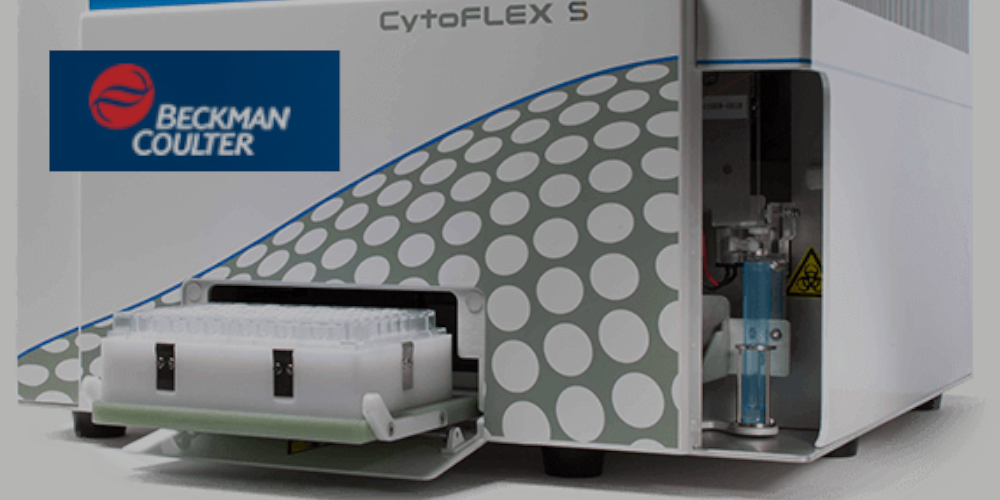Flow cytometry
Flow cytometry and cell sorting
Multicolor flow cytometer CytoFlex S B5-R3-V3-NUV2 (Beckman Coulter)
https://www.beckman.com/flow-cytometry/research-flow-cytometers/cytoflex-s/b78557

CytoFLEX S multicolor flow cytometers is equipped with a blue, red, violet and near UV lasers (see Figure).
CytoFlex S B5-R3-V3-NUV2 allows to measure up to 21 fluorescent parameters for the following wave lengths: 355nm, 375 nm, 405 nm, 488 nm, 638 nm, 808nm. It includes 13 repositionable bandpass filters, 450/45 (2), 525/40 (2), 585/42, 610/20 (2), 660/10, 675/30 , 690/50, 712/25, 780/60 (2). The complete system is supplied with computer work station with CytExpert Acquisition software, sheath and waste containers with harness.
The advancement of flow cytometry into nanoparticle scale resolution, makes it possible to ask questions previously left to speculation. Several fundamental capabilities of flow cytometry make this an attractive platform for studying nanoparticles such as extracellular vesicles, the ability to detect large numbers of events, and discrimination of rare events, while simultaneously collecting information on phenotypic expression. The CytoFLEX Flow Cytometer has the resolution to detect particles smaller than 200 nm within a phenotypic context.
Multicolor flow cytometer / cell sorter BD FACSAria Fusion Cell Sorter (BD Life Sciences)

Optics
Excitation Optics
Optical Platform
Fixed optical alignment of all Class IIIb lasers with the cuvette flow cell. All lasers are solid state.
Beam height: 9 ±3 μm
Beam width: 65 ±7 μm
Beam shaping: elliptical
Power Out of the Laser Head
405 nm: >85 mW
488 nm: >50 mW
640 nm: >100 mW
Steering Optics
Fiber optics steer the fixed-alignment laser beams onto the expansion prisms to focus them on the cuvette flow cell.
Emission Optics
Optical Coupling
The quartz cuvette flow cell is gel-coupled by refractive index-matching optical gel to the fluorescence objective lens for optimal collection efficiency. Numerical aperture: 1.2
Forward Scatter Detector and Filters
Photodiode with 488/10 bandpass filter for the 488-nm laser.
Side Scatter Detector
Photomultiplier with a 488/10 bandpass filter for the 488-nm laser.
Fluorescence Detectors and Filters
An octagon technology (BD Octagon™) detector array for the 488-nm and 405-nm lasers.
A trigon technology (BD Trigon™) detector array for the 640-nm laser.
Detector arrays enable user-defined detection configurations, filters and mirrors are user changeable.
Wavelengths Detected from the 488-nm Laser without the 561-nm Laser Installed
530/30-nm FITC, Alexa Fluor® 488
585/42-nm PE
616/23-nm PE-Texas Red®, propidium iodide (PI)
695/40-nm PerCP-Cy™5.5 or PI, or 675/20-nm PerCP
760/60-nm PE-Cy™7
Wavelengths Detected from the 640-nm Laser
670/30-nm APC, Alexa Fluor® 647
780/60-nm APC-Cy7 or APC-H7
Wavelengths Detected from the 405-nm Laser
450/40-nm BD Horizon Brilliant™ Violet 421, V450, VPD450, Pacific Blue™, DAPI
525/50-nm BD Horizon Brilliant™ Violet 510 or V500, AmCyan
610/20-nm BD Horizon Brilliant™ Violet 605
Fluidics
General Operation
Sheath and cleaning fluid tanks, as well as waste collection, are located in an easy-to-reach drawer at the base of the system. An auxiliary air input is designed to connect the cytometer to a lab’s air filtration and drying system. If needed, a third-party compressor is available as an option. Sheath pressure is adjustable from 5 to 75 psi.
Fluidic Reservoirs
Autoclavable 10-L sheath and waste containers and 5-L cleaning reservoirs are provided.
Sample Flow Rates
Adjustable dynamic range of sample flow rates
Nozzles
70, 85, 100 and 130-μm nozzles are removable and can be sonicated.A registered key-fit position at the bottom of the cuvette provides fixed stream alignment.
Sample Collection Cooling and Heating
Refrigerator/heater option is available to provide cooling or heating for sort collection into tube holders, multiwell plates and slides.
Automatic Cell Deposition Unit
Sorts into slides and 6, 24, 48, 96 and 384-well plates. Index sorting can be enabled when sorting single cells. This capability indexes the cell surface phenotype to the well containing that cell.
Sort Performance
Drop Drive Frequency
Range: 1–100,000 Hz
Purity and Yield
At 70 psi and 87 kHz with an average threshold rate of 25,000 events persecond, a four-way sort achieved a purity of >98% and a yield >80% of Poisson’s expected yield. Higher threshold rates up to 70,000 events per second can be achieved without affecting purity. However, yield will decrease based on Poisson’s statistics.
Sort Collection Devices
Two-way sorting: 12 x 75-mm and 15-mL tubes
Four-way sorting: 1.5-mL microtubes and 12 x 75-mm tubes
Sort Collection Cooling
Water recirculator for refrigeration or heating (optional)
BD FACS™ Accudrop
Red diode laser provided forfully automated drop-delay determination
Automated drop breakoff monitoring
Automated clog detection and sort tube protection system using Sweet Spot technology
Signal Processing
Converter
10-MHz analog-to-digital converter. Pulse sampling is precisely matched to the particle flow rate in the cuvette. Particles travel slower compared to conventional stream-in-air sorters. This increases the light collected, resulting in better sensitivity. High-speed sorting is achieved by accelerating the stream through the nozzle, achieving drop rates comparable to stream-in-air sorters. The flow cell design and electronics are matched to maximize signal while maintaining maximum sort speed, purity and yield.
Workstation Resolution
262,144 channels
Data Acquisition Channels
20 parameters (18 fluorescence and 2 scatter)
Fluorescence Compensation
No limit to inter- and intra-beam compensation
Pulse Processing
Height, area and width measurements available for any parameter. Ratio measurements are also available.
Time
Time can be correlated to any parameter for kinetic experiments or other applications.
Channel Threshold
Available for any parameter from any laser, with the ability to use multiple thresholds from different lasers simultaneously.
Loading
Sample Input Sizes
Microtubes, 12 x 75-mm and 15-mL tubes
Polystyrene or polypropylene tubes can be used.
Sample Input Agitation
Adjustable through the software to keep the sample constantly suspended
Temperature Control
Sample input: 4ºC, 20ºC, 37ºC and 42ºC (adjusted in the software)
Sample output: water recirculation unit (optional)



